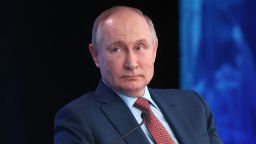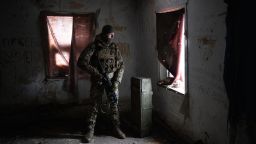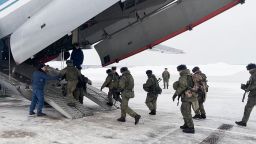Editor’s Note: Frida Ghitis, (@fridaghitis) a former CNN producer and correspondent, is a world affairs columnist. She is a weekly opinion contributor to CNN, a contributing columnist to The Washington Post and a columnist for World Politics Review. The views expressed in this commentary are her own. View more opinion on CNN.
By the time the closing ceremony marked the end of Russia’s 2014 Winter Olympics in Sochi, pro-Russian demonstrators in Ukraine’s Crimean Peninsula were already out in the streets. Within days, the unidentified “little green men,” masked soldiers with hidden insignia, began what became Russian President Vladimir Putin’s most brazen violation of international law: the capture and annexation of another country’s territory.

Putin waited until the Sochi games were over to launch the attack on Crimea, probably so as not to detract from what he hoped would be a showcase for Russian achievement. There were other theories about the timing – including an effort to distract from the growing allegations of massive corruption around the expense of hosting The Games – but the need to keep a spotlight on Sochi was likely a motivating factor.
Eight years later, as Putin prepares to attend the opening ceremony of Beijing’s Winter Olympics next week, Russian troops have amassed along Ukraine’s borders, awaiting the Russian President’s decision on whether or not to invade.
This time, Putin will likely think twice before overshadowing the Olympics (or at least the earlier part of it) and marring Chinese leader Xi Jinping’s time to shine on the global stage. That’s because Putin and Xi have become the world’s autocracy bros.
The two leaders have undertaken eerily similar tactics to achieve the results to which they both aspire. They have both orchestrated a change of rules so they can stay in power for decades beyond their term limits. To maintain their grip on power, they are also increasingly crushing dissent at home, imprisoning critics – and worse, intimidating their neighbors and seeking to expand their country’s sphere of influence.
They have shown themselves willing to do whatever it takes to silence calls for democracy and human rights at home. They have cracked down and accused their own citizens of acting as puppets of foreign powers, as if it were impossible to live in China or Russia – in, say, St. Petersburg or Hong Kong – and genuinely desire democracy.
China makes it a point to tell its citizens and the world that Western-style democracy is an inferior, chaotic and ineffective system. Russia, too, portrays the US as a declining superpower, but a threatening one nonetheless. They argue that democracy and human rights, rather than a universal yearning, are a fabrication of the West. And, for good measure, they silence anyone who seems to be accumulating too much power, including business tycoons, unless they seem sufficiently subservient.
Rather than a significant ideological motivation, the main purpose of these repressive tactics is to protect their rule.
Putin talks about NATO and the threat it poses to Russia’s borders. But it’s Ukraine’s turn toward a freer, democratic West that troubles him most. The yearning for freedom is contagious and he knows it. So does Xi.
Putin knows that a democratic Ukraine on Russia’s border can inspire those at home who want change, just as West Germany’s freedoms during the Cold War prompted the Soviet Bloc to build a wall around East Berlin. In the 1980s, Putin was stationed in Dresden as a foreign KGB agent when East Germans tore down the wall – an event that set the stage for the Soviet Union’s collapse.
To cement their hold on power, autocrats love to stage mega-events, none better than the Olympics. They represent an opportunity to proclaim their success to their people and to the world; to make the unspoken argument that, whatever price they have extracted in repression, the ends have justified the means. For maximum impact, however, they need the world’s rapt attention.
This week, Chinese officials denied that Xi asked Putin to postpone an invasion of Ukraine until after the Beijing Games, but they made no secret of their disdain for those who claim Ukraine has a right to choose its own path. After Xi and Putin spoke last month, state television quoted the Chinese leader as saying, “At present, certain international forces are arbitrarily interfering in the internal affairs of China and Russia under the guise of democracy and human rights.” Xi and Putin, brothers in arms!
And arms they have. Military force is a key tool in their strategy to expand the spheres of influence beyond their borders. The Chinese military is building artificial islands and military bases in disputed waters; routinely flying military aircraft around Taiwanese airspace and otherwise intimidating its neighbors. Russia has deployed its military in Georgia, Ukraine and Kazakhstan. And next month its forces are scheduled to hold maneuvers in Belarus, adding another threat to Ukraine from the north.
China and Russia have a history of rivalry and there are still areas of friction. (Whose sphere of influence, for example, should Central Asia – including Kazakhstan – fall under? They both want it.) But for now, Xi and Putin are linking arms against their main foe, the United States, and its allies in Europe. Both China and Russia face Western sanctions. The two men see in each other a kindred, autocratic spirit.
One week before the Olympic torch is due to arrive in Beijing, with China facing a “diplomatic boycott” of The Games by several democratic countries, and Russia in the midst of tense negotiations over Ukraine, the Chinese foreign ministry spokesman, Zhao Lijian, nearly waxed lyrical when he declared, “There is no ceiling to China-Russia mutual trust, no forbidden zone in our strategic cooperation and no limit on how far our long-standing friendship can go.”
After such a passionate declaration, it’s hard to imagine Putin would knowingly overshadow China’s Olympic moment. Of course, the last time China hosted The Games in 2008, Putin sent his troops into Georgia. That, however, was long before Xi rose to the top job.
This time around, China had the United Nations adopt an “Olympic Truce” resolution, a moving commitment to refrain from hostilities from one week before the start of The Games to one week after the end of the Paralympic Games. If Putin decides he wants to invade Ukraine, that time frame – until March 20 – is much too long. By then, Ukraine’s frozen ground will have melted into barely-passable mud for Russian tanks.
Meanwhile, the US and Ukraine don’t appear to be on the same page over the level of threat of a Russian attack. A senior Ukrainian official told CNN on Thursday that a call between Biden and his counterpart Volodymyr Zelensky “didn’t go well” – an account the White House disputed.
As for Russia’s next move, only one president really knows the answer. When Putin sits in the stands at the Bird’s Nest stadium in Beijing on February 4, watching the opening ceremonies, he will likely keep his troops waiting a few days, even if he has decided to launch what would be a calamitous invasion. He will do it for Xi’s sake. After all, that’s the least a brother can do.
Unless, of course, he chooses to go in before The Games begin. In which case, the clock is ticking.







